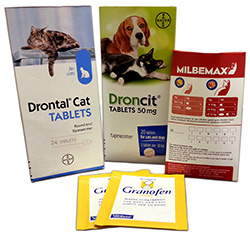Worming and Litter Training Your Kitten
Worming
Kittens should be wormed every fortnight until they are 12 weeks of age, then monthly until they are 6 months of age, and then every 3 months thereafter. Cats who hunt or wander are most at risk and may need to be wormed more regularly.
There are a number of worming products available for cats, and we can advise you as to the most appropriate for your cat.

Litter Training
Most kittens will already know how to use a litter tray by the time you get them. However it is confusing, going to a new home with new ‘humans’ and a different routine. Accidents are most likely to happen in the first few days and your kitten will appreciate your patience while trying to work out what is appropriate behaviour. The kitten will squat and lift its tail just before going to the toilet. If you see this happen, gently and calmly pick the kitten up and place them in the litter tray.
The number of litter trays needed depends on the number of cats and whether they are mainly indoor cats or use the garden. For entirely indoor cats, the accepted rule of thumb is:
Number of litter trays = Number of Cats + 1
There are a various litter trays and types of litter available. A shallow tray is best for a kitten and you can upgrade this to a bigger, deeper tray or a hooded one as suits your cat and yourself. Routine is very important to your cat, so any changes to tray or litter must be made gradually or will confuse your kitten and may cause toileting problems.
Please do not use air fresheners on the litter tray as the smell of the litter is very important to the kitten. Be careful with harsh detergents when cleaning the litter tray, as these may cause abrasive lesions on their pads. A mild household disinfectant should be adequate. Finally, cats are very clean animals and will not use a soiled litter tray. Some cats are more tolerant than others, but the most common reason that cats soil elsewhere in the house is a dirty litter tray. Change the litter tray at least once daily.

